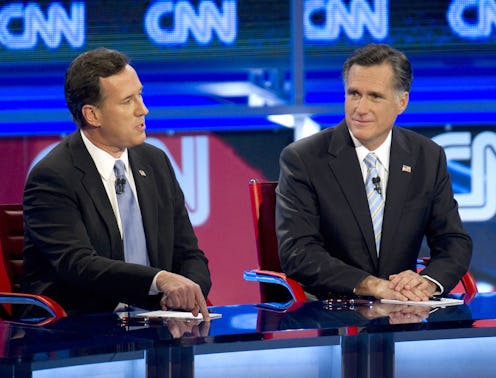News
How Do The 2015 And 2011 GOP Debaters Compare?
With the 2016 debates fast approaching, the first being the highly anticipated Republican showdown on Thursday, it's hard not to think of past debates the Republican National Committee (RNC) has hosted, particularly during the last election cycle in 2011. Most of our political issues have altered in four years, but many of the candidates seem pretty similar. In fact, there are a lot of ways 2015 Republican debate candidates compare to those in 2011.
The first Republican debate of 2011 was in May and had only five candidates: Herman Cain, Gary Johnson, Ron Raul, Tim Pawlenty, and Rick Santorum. Santorum certainly has enough debate experience on his resume now, and I know I've heard the name "Paul" somewhere lately.
Cain resembled Ben Carson in that one of the most important issues to him was a flat tax. Johnson, who ran as a third-party Libertarian, was like the younger Paul and Ted Cruz in their embrace of small government. Comparisons have also been made between Scott Walker and Pawlenty, another midwestern governor, who didn't poll well in Iowa and later dropped out of the race. Some analysts claim that although his policies looked reasonable, he didn't have the stage presence to beat his competitors, which is what many also say about Walker.
Like the current candidates debating Thursday, most of these Republicans were pro-life and against gay marriage, but as a whole, economic issues seemed more important to them, as effects of the recession were more visible.
The second Republican debate in 2011 was June 13, and by then, three more candidates joined the GOP race: Michele Bachmann, Newt Gingrich, and Mitt Romney, who would eventually nab the party's nomination. In 2011, the GOP's Tea Party had more clout, so candidates such as Bachmann rose up and got attention. She was sort of like Donald Trump with her headline-catching statements, or Carly Fiorina in that she served as the party's token female candidate who could try to represent women's issues.
Newt Gingrich was similar to Chris Christie in that they both tend to lose their tempers in strange ways. They could practically write Saturday Night Live's sketches on themselves with their odd mannerisms and ideas.
It's hard to say who will take Romney's spot as the final Republican candidate for the 2016 race. Jeb Bush seems like he could speed ahead of Trump and adopt Romney's time-tested brand as the likable white guy who looks normal compared to the other crazy candidates.
By the third 2011 debate on Aug. 11, the only new politician on stage was Jon Huntsman Jr., but it's still unclear who Huntsman's 2015 counterpart might be, as he was more moderate than the current frontrunners and was willing to work with President Obama.
Rick Perry made his first debate appearance on Sept. 7 and doesn't appear to have changed much since. To be honest, not much in the GOP pool of candidates is really all that different.
